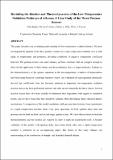| dc.contributor.author | Bugler, John | |
| dc.contributor.author | Somers, Kieran P. | |
| dc.contributor.author | Silke, Emma J. | |
| dc.contributor.author | Curran, Henry J. | |
| dc.date.accessioned | 2016-04-06T14:56:32Z | |
| dc.date.available | 2016-04-06T14:56:32Z | |
| dc.date.issued | 2015-03-23 | |
| dc.identifier.citation | Bugler, J,Somers, KP,Silke, EJ,Curran, HJ (2015) 'Revisiting the Kinetics and Thermodynamics of the Low-Temperature Oxidation Pathways of Alkanes: A Case Study of the Three Pentane Isomers'. Journal Of Physical Chemistry A, 119 :7510-7527. | en_IE |
| dc.identifier.issn | 1520-5215 | |
| dc.identifier.uri | http://hdl.handle.net/10379/5636 | |
| dc.description.abstract | This paper describes our developing understanding of low-temperature oxidation kinetics. We have investigated the ignition of the three pentane isomers in a rapid compression machine over a wide range of temperatures and pressures, including conditions-of negative temperature coefficient behavior. The pentane isomers are small alkanes, yet have;structures that are complex enough to allow for the application of their kinetic and thermochemical rules, to larger molecules. Updates to the thermochemistry of the species important in the low temperature oxidation of hydrocarbons have been made Alternative based on a thorough literature review. An evaluation of recent quantum-chemically derived rate coefficients from the literature pertinent to important low-temperature oxidation reaction classes has been performed, and new rate rules are recommended for these classes. Several reaction classes have also been included to determine their importance with regard to simulation results, and we have found that they should be included when developing future chemical kinetic mechanisms. A comparison of the model simulations with pressure-time histories from experiments in a rapid,compression machine shows very good agreement for both ignition delay time and pressure rise for both the first, and second-stage ignition events. We show that revisions-to both the thermochemistry and the kinetics are required in order to replicate experiments well. A broader validation of the Models with ignition delay times from shock tubes and a rapid compression machine is presented in an accompanying paper. The results of this study enhance our understanding of the combustion of straight and branched chained alkanes. | en_IE |
| dc.description.sponsorship | Irish Research Council | en_IE |
| dc.format | application/pdf | en_IE |
| dc.language.iso | en | en_IE |
| dc.publisher | American Chemical Society | en_IE |
| dc.relation.ispartof | Journal Of Physical Chemistry A | en |
| dc.rights | Attribution-NonCommercial-NoDerivs 3.0 Ireland | |
| dc.rights.uri | https://creativecommons.org/licenses/by-nc-nd/3.0/ie/ | |
| dc.subject | Rapid compression machine | en_IE |
| dc.subject | Pressure rate rules | en_IE |
| dc.subject | N-heptane | en_IE |
| dc.subject | 1-pentyl radicals | en_IE |
| dc.subject | Molecular oxygen | en_IE |
| dc.subject | Air mixtures | en_IE |
| dc.subject | Decomposition | en_IE |
| dc.subject | Ignition | en_IE |
| dc.subject | Hydrocarbon | en_IE |
| dc.subject | Ethyl | en_IE |
| dc.subject | Chemistry | en_IE |
| dc.title | Revisiting the kinetics and thermodynamics of the low-temperature oxidation pathways of alkanes: a case study of the three pentane isomers | en_IE |
| dc.type | Article | en_IE |
| dc.date.updated | 2016-04-06T10:17:15Z | |
| dc.identifier.doi | 10.1021/acs.jpca.5b00837 | |
| dc.local.publishedsource | http://pubs.acs.org/doi/abs/10.1021/acs.jpca.5b00837 | en_IE |
| dc.description.peer-reviewed | peer-reviewed | |
| dc.contributor.funder | |~| | |
| dc.internal.rssid | 9396579 | |
| dc.local.contact | Henry Curran, Dept Of Chemistry, Room 215, Arts/Science Building, Nui Galway. 3856 Email: henry.curran@nuigalway.ie | |
| dc.local.copyrightchecked | Yes | |
| dc.local.version | PUBLISHED | |
| nui.item.downloads | 724 | |


